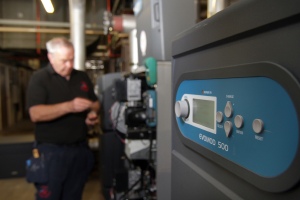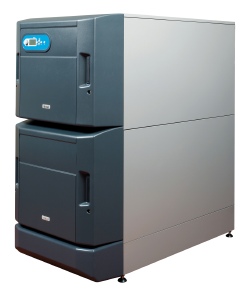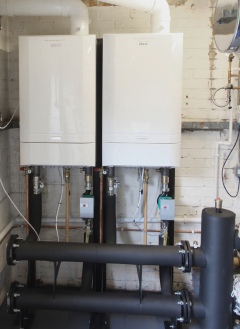Service maintained

Darren Finley of Ideal Commercial Boilers, explores why an increasing number of commercial building owners are investing in refurbishment projects and discusses innovative features offered by modern boilers to enable quick and easy installation — ensuring that work can be completed with minimum disruption to services.
Many of those in charge of commercial buildings choose the summer months to upgrade their heating systems, as the higher outdoor temperatures mean that the inner environment can remain comfortable even if the boiler needs to be shut down for a period of time. However, some applications need a stable heat source around the clock, regardless of the weather, with care homes being the most obvious example.
 |
| Modern boilers are designed for easy integration with a building-management system. |
Every care home has a legal obligation to maintain a particular indoor temperature because elderly people are vulnerable to cold. Although boiler replacement is best scheduled for the warmer months for obvious reasons, swift installation is still vital to minimise loss of heating service. According to a report by the Royal College of Nursing, the demand for places in care homes will double over the next 20 years, so the requirement for high-efficiency boilers that can be installed quickly can only increase.
An added benefit of replacing an old heating appliance with a modern condensing boiler, of course, is that running costs and carbon emissions will be reduced, as these boilers will have been designed to meet Part L of the Building Regulations as well as future legislation such as the Energy-related Products (ErP) Directive, due for implementation in 2015. It is therefore up to boiler manufacturers to develop adaptable easy-to-install heating solutions that will minimise downtime and heat loss, particularly for applications that require a continual heat source, whilst also reducing energy use.
Floor standing
Designed specifically to meet these requirements, leading boiler manufacturers have developed high-specification floor-standing boilers that can deliver large outputs combined with an extremely small footprint. The compact size of these appliances not only clears space in the plant room for additional plant or storage facilities, it also makes transportation of the boiler much easier when the heating engineer is faced with tight corridors or space constraints within the plant room.
 |
| The modular format of some floor-standing boilers, such as Ideal Commercial’s Modusat, enables larger outputs to be met from the same floor area. |
The innovative design of such floor-standing boilers is due to their modular construction. Each boiler module can offer outputs of around 250 kW and can be stacked up to three modules high, thereby tripling the output without taking up any extra floor space. The maximum output with dedicated models is 1000 kW, with a total of four modules stacked two-high and side by side, operating as one boiler via a single control panel.
If modules need to be separated for delivery, this is easily done, and they can be quickly reassembled back in the plant room. Floor-standing boilers with such modular design are usually so much smaller than the appliances they are replacing that they are often installed alongside half or even a third of the existing boiler plant, which can remain running until the last moment. Connections and pipework can then be quickly switched to the new boiler, minimising or even avoiding any substantial loss of heating service.
Boiler efficiency is also enhanced by this type of modular design. Each individual module can be capable of a 5:1 turndown ratio, so a boiler consisting of four modules can offer an impressive turndown of 20:1. This, coupled with net efficiencies of around 108.5%, can result in fuel savings of over 25% when specified to replace existing plant. Effective controls are also essential to minimise a building’s energy use, and leading manufacturers will be able to supply boilers with either built-in remote diagnostics, sequencing and remote indication or, in the case of larger applications, easy integration with a building-management system (BMS) via a 0 to 10 V boiler-control input option.
Wall hung
Wall-hung options offer an easy-to-install option for commercial buildings and are now available with outputs up to 150 kW for a single unit, which is one of the highest available on the market, allowing them to be specified for larger commercial projects.
 |
| Frame and header kits for wall-hung boilers greatly reduce installation time. |
When even larger outputs are required, modern wall hung boilers can be installed in cascade to reach outputs of over 600 kW, with some manufacturers simplifying installation still further by providing dedicated frame and header kits. These cascade headers provide the option of easy self-assembly using prefabricated components and pipework — including valves, pressure-relief valve and flow and return flexible connections. This option can greatly reduce installation time and also avoids the occurrence of missing parts in transit as the kit will arrive conveniently shrink wrapped together on one palette.
Low-height versions are available as another alternative, so that even floor-standing boilers in low-ceilinged plant rooms can be replaced with high-efficiency, compact wall-hung alternatives.
Frame and header kits are also designed to minimise energy use through advanced control options, as they can be installed either with the manufacturer’s own sequencer or a proprietary option.
Boiler technology has evolved over the years to meet industry demand, with energy efficiency and ease of installation being two core areas of development that manufacturers have focused on. This is evident in the boiler models available today, which present a range of solutions that simplify installation, minimise downtime and also deliver energy savings that meet current and expected legislation whilst reducing running costs.
Darren Finley is national sales director for Ideal Commercial Boilers.







